What does it mean to be a Community Climate Champion?
In April 2023, Artsadmin launched a new engagement project which brought together seven people who lived, worked or studied in Aldgate, Whitechapel, Spitalfields or the City of London to co-design and participate in our biannual festival of art, climate and community – What Shall We Build Here. Hear from three of the Champions – Leah, Georgina and Yasmin – about what the experience meant for them.
Leah is a City of London resident and is deeply involved in conversations about the Climate Crisis in both her work and personal life. As a resident, professional and parent, Leah values the importance of using their voice to add to the wider perspective on the Climate Crisis. She sees the urgency of Black and Brown people being part of these conversations and recognises that structures have not traditionally centred their voices.
Georgina moved to London in 2019 and is studying Interior Architecture and Design at London Metropolitan University. Georgina believes that using the tools available to you to educate yourself is the best way that knowledge can be shared with others and that spaces of creative community can bring forward innovative ideas. Georgina is interested in how the climate conversation influences her creative practice and focuses on making conscious, informed and sustainable decisions in her approaches to design.
Yasmin was born and raised in Tower Hamlets and is now based in Whitechapel. She is passionate about local community, especially as a Bangladeshi person. Yasmin sees creative expression and artistic projects as her tools for change and uses these methods within her artistic and professional practice, to articulate social issues impacting her local area. She sees the importance of accessible community education around Climate Change and thinks it is vital for conversations to be made more inclusive, particularly for people who have experienced financial hardship and/or that are of global majority backgrounds.
Leah
When Artsadmin put out a call out for people in my local area to become Community Climate Champions, I had visions of standing in spartan supermarket forecourts wearing a sash, a rosette and a deadpan expression while someone played plinky piano music. Maybe next to a miniature pony. Wes Andersen memes and cliches aside, I wasn’t entirely sure what I’d signed myself up for. And, besides, I probably couldn’t do it because I have a toddler and all the sessions would be in the evening when normal people clock off from work and had free time.
Not gonna lie, the first thing that shocked me when I was accepted was that organisers said they would pay for childcare. This, friends, is a gamechanger. No matter what I said, or did, the fact that someone out there thought that forking out for childcare so they could listen to what I felt about our current and impending climate-fuelled apocalypse speaks volumes. And that was just first base.
On second base, working through our climate grief and trauma devising a hands-on nature-infused workshop with Zoë Laureen Palmer was super nice. Lovely. The kind of thing you would expect to pay a hippie therapist £200 an hour to do. We sewed little sleep bags that I still keep under the pillow, took home some plants (that I promptly murdered because I’m that bad with plants), and cut and pasted our way into conversations about ideas and ideals and dreams. The kind of experience that snaps back into your focus when you realise you came out of the whole thing smarter and more human.
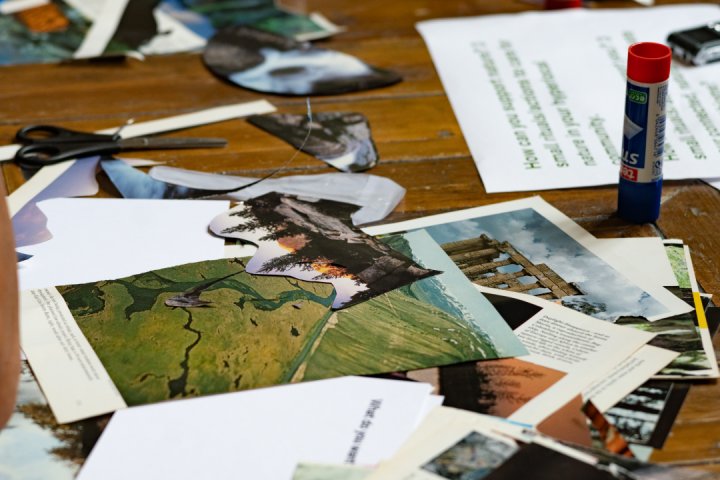
Third base was the People’s Palace of Possibility and the Palace Feasts held there. All the Climate Champions – many of whom I feel I will probably encounter sometime in the future – curated and presented a radio show. A little bit Desert Island Discs with some Exquisite Corpse thrown in. I also loved the fact that I was the only person who’d presented on the radio before – which was proof positive that all folks need to shine is access to the platform. Which is often what we all need to make social change happen.
The home stretch was something I participated in as a comp-carrying punter. Nwando Ebizie’s Extreme Unction Vol.2 was billed as afro-futurist, multisensory, immersive etc. For someone with my flavour of synaesthesia, it’s the one thing I wanted to take home with me and unwind with at the end of every day. Relaxing and connecting, it was a full-body reset and recharge. You’re not going anywhere or changing anything on this planet without a full set of batteries – and this is just what Ebizie’s work gives you.
And, again, none of these experiences would have been possible for me if someone out there didn’t say “hey, yeah, let’s support this person with some childcare.” So when you’re out there making shit happen, step back and think about how the smallest of gestures, kindnesses and considerations could already be changing the world for someone. It did for me and I’m eternally grateful for that love.
Georgina
I initially applied to become a ‘Community Climate, Champion’ after seeing it advertised by one of my lecturers as a climate, community and arts opportunity. It piqued my interest as it was only offered to people who had a personal connection with Aldgate/Whitechapel. Having spent so much time there myself over the last 3 years of study and becoming accustomed to the local street markets, restaurants, pubs, shops, buildings and locals, I feel a great love and familiarity for the local area and was keen to get more immersed in some way as the community had already offered so much to me throughout university.
After being offered the opportunity to be part of the summer project at Toynbee Studios entitled ‘What Shall We Grow Here?’, one began to wonder what the position actually entailed, therefore I entered the experience intrigued and open-minded. The first session meeting the other 6 participants was insightful in understanding the context for everyone’s role within the Aldgate/Whitechapel communities which ranged from residents, students, workers and even experiencing their own childhood locally.
Right from the get-go, being around such an interesting mix of personalities, ages, backgrounds and genders allowed for candid conversations around the questions relating to ‘What Shall We Grow Here’. We all had to let go of any pre-conceived notions of what this phrase might mean, and the conversations flowed into many lines of questioning – ranging from climate, psychology, corporations, personal experiences and moral responsibility. I did not feel like the session was intended to create any framework or outcome, it felt like an opening into the possibilities of the project, which I believe everyone present embraced without judgement or prejudice; which was very refreshing.
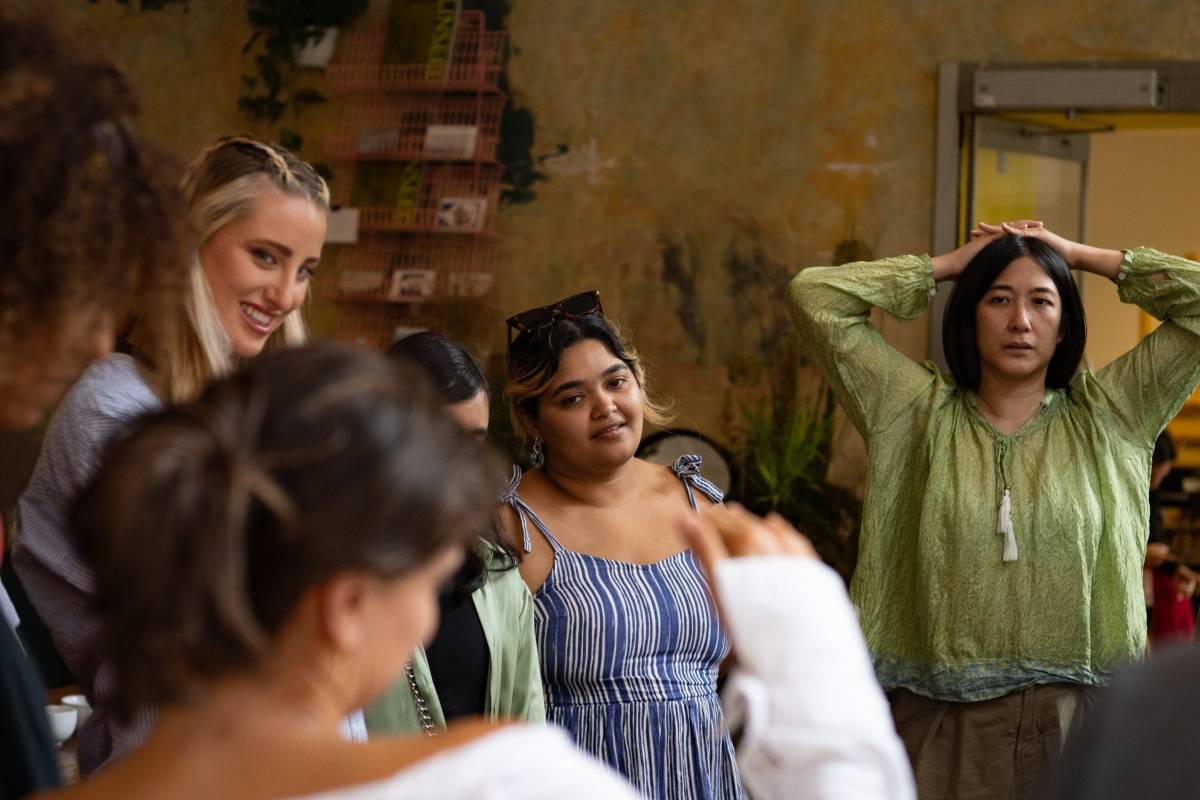
On a practical level, I was able to immerse myself into ideas I had not yet experienced. Learning about the healing properties of herbs, plants and trees was something that I wish was not just reserved for the few. I have subsequently implemented some of these into my own daily rituals, with herbal teas from my own fresh plants at home. I am irrefutably aware of my own privilege having not grown up in the city and being used to seeing greenery and nature from my own vernacular and often taking it for granted. It was a reminder after being involved in discussions with others at the workshop that we all have a different perspective on the elements around us that remind us of home and for some it might seem completely foreign to know much more than man-made architecture and intentionally planted trees, so using plants within the home aesthetically or medicinally could feel deterring.
Another unfamiliar experience was being involved in an interview-style radio set, talking about the relevance of music to a moment in your life – this I believe made some of us feel very vulnerable and exposed, as music can often commemorate a significant moment in one’s life and is not something we tend to share with others. It made me feel very privileged to listen and share with my peers in such an intimate way and was a great tribute to the individuals and organisers of the project to create a space for this feeling to circulate.
The sessions continued with many offerings throughout the festival and our own involvement in co-curating a workshop for the public which was great in contributing other perspectives/ voices of their own interactions with their local community and what that looks like in their personal daily lives. Everyone made promises to themselves at the end of the session of practices they were going to include in their own life moving forward to positively benefit oneself or those around them. Some were as simple as picking up more litter in their local streets or watering their own house plants more regularly.
These postcard promises will be sent to our addresses in the future as a reminder of the intentions that were set in that moment and to see if we have stuck to one, if any, of them. Some of these concepts might feel quite small in the grand scheme of things and one might often find themself feeling cynical and hopeless when we’re continuously bombarded by the ‘end of the world’ media rhetoric. But I wonder in a years’ time if the 20 odd people that made those intentions on a July day, all stuck to one commitment that must have done some good if not to the planet maybe to the overall health and happiness of themselves or those around them, then that must count for something.
As I reflect on my own active intentions following the Community Climate Champions experience, I feel without having taken part I would perhaps not have finally taken the initiative and put up the mini greenhouse in my own garden that had been sitting there for 5 months. I am now the proud mother of an array of blossoming vegetables, herbs and chillies which should be a great way of saving my own money on food eventually and taking even greater pride in the meals created from my own produce. This is not something I even thought I would be confident enough to consider, as prior to this, I had never even re-potted a plant or owned much more than a cactus.
This is a huge personal change and something I can impart, however novice, on friends of my own and who knows, maybe someone else in my community will pass that on too. That is how I have chosen to encapsulate the project in my own mind ‘community inspires community’.
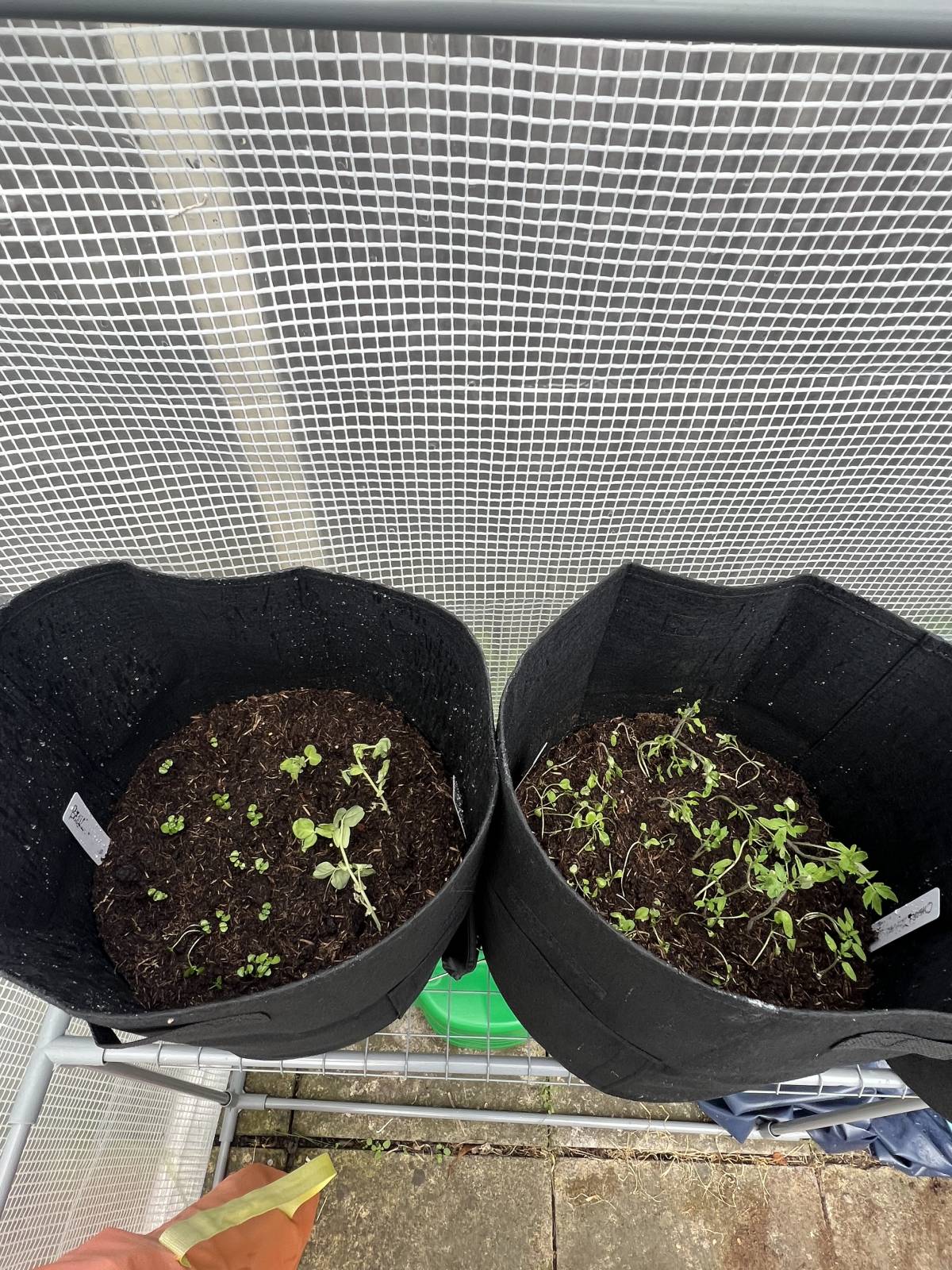
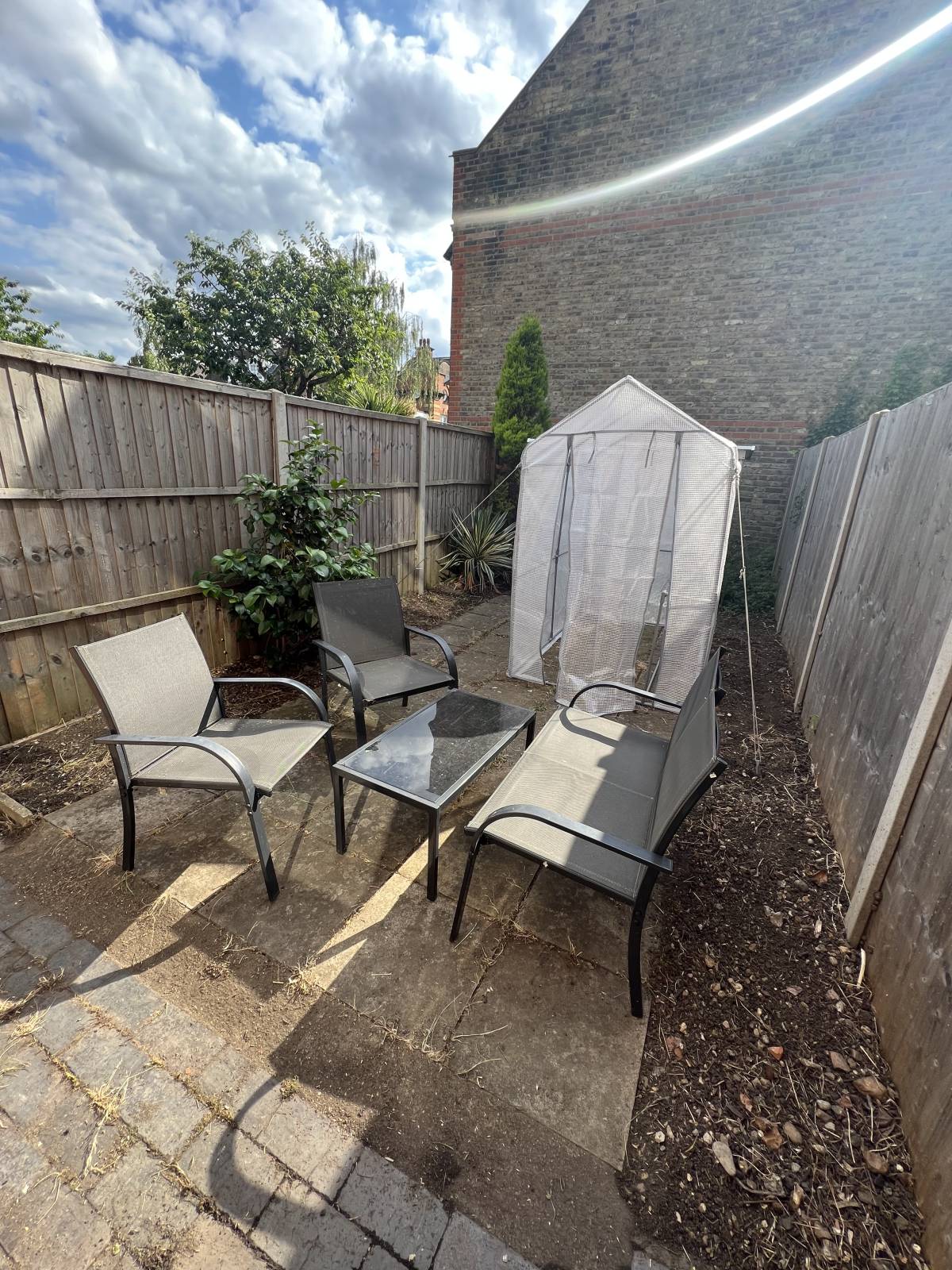
Yasmin
In July 2023 I had the opportunity to participate in What Shall We Build Here? festival with Artsadmin, with six other Community Climate Champions. We took part in workshops, discussions and activities about the issues surrounding climate change at Toynbee Studios, which culminated in two events at the festival: a creative workshop called “What Shall We Grow Here?” with Zoë Laureen Palmer and an hour-long conversation on The Bare Project’s Palace Radio station.
My fellow champions came from many different walks of life – students, creative freelancers, city workers… all agents of change in some capacity. Zoë laid out various natural materials for us to interact with. Notable out of these were bay leaves (reminiscent of cooking with my mum), corn husks (so lovely to run your hands through) and sage (something rather mystical about this one). We were encouraged to discuss a place in nature that was significant to us while we filled these into a little pouch, which we would sew into a pillow. These pouches were meant to help us sleep better, and maybe have the occasional strange dream. Some things that came up were trees and beaches, being able to feel lost in nature, getting out of the city more. It struck me that I wasn’t sure the last time I felt like I was surrounded by nature, or when I breathed in fresh air. It is so significant when I am in a natural place these days that I remark on it.
The general feeling amongst fellow participants was that environmental activism was out of touch with people who weren’t already interested in it. Personally, I felt like there was a lack of consideration but in some ways, there was far too much instruction in climate change and not enough action top-down. Recycling would be less pressing an issue for a single mother in East London for example, than being able to feed their children by growing coriander, lemons, and chillies in their back garden and if they do not have a garden, giving them access to an allotment. Leah posed the question: “why should people care?” Georgina brought up the growing popularity of office plants and how they have become more and more domesticated and are not fulfilling their function; in this way plants have become elitist.
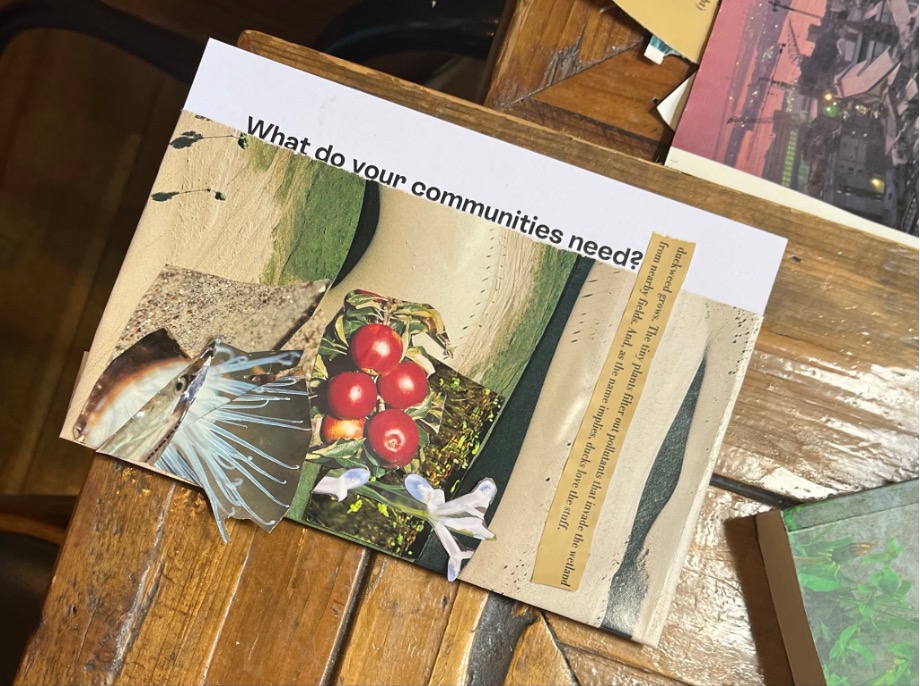
With Zoë we co-curated a workshop for the festival – one based on conversations and activities. At the workshop we facilitated a pine tea-tasting session, posed questions for the participants, created collages, and gave away lemon balm plants to everyone. The tea contained pine, pollen, and warm water – it tasted soothing, medicinal, and healing. I explained to them the properties of pine – with as much knowledge as I could ingest in the week previous! It was a unique experience for the participants; Zoë has a way of tapping into a person’s biophilia by urging someone to reflect on their own wellbeing and personal goals, especially when everyone was making collages of their idea of what makes them content – nature was abundant in the collages. The presence of natural ingredients themselves, connect the conversation to nature and a person’s relationship to the natural world. I think this may also have something to do with Zoë’s soothing tone.
With Malaika Cunningham from The Bare Project, we meditated on some of the most pressing questions of our time. I was in a place of realising my self-autonomy as a creative freelance, fresh out of the intensive studio film environment – the topics that stayed with me were:
- How do you decide when to obey authorities and when not?
- Why are we all so tired?
- What does good work look like?
We were tasked with choosing a song to answer a question for our hour-long slot on The Palace Radio on the morning of Saturday 1st July. I chose “How can we breathe better?” and answered it with the song “And the living is easy”. It is a funky song with an unusual pace, repetitive and easy to enjoy in the moment. We created a running order, designed in a way that we all could interview each other. I got to live out a fantasy introducing the radio show, with a “hope everyone got a well-deserved lie-in!”. I was amazed by how articulate everyone was in their conversations. One skill we all honed during this was the art of conversing.
Things moved really fast during the course of the project. We would decide on a programme of events and everything would appear like magic, a testament to the hard work of Maya, the artists and the Artsadmin team to pull this off in 6 weeks from conception to delivery. It appeared seamless to all involved. Given more time, we could have gotten more of the local community in and involved with the projects too, as what we created was such a collaborative space.
Generally, I think we achieved something we wanted to here; creating collaborative spaces where questions were posed without a curated outcome, information-sharing and where all experiences were valid – we came away with a sense of achievement, a taste for change and feeling that we are able to continue the conversation.
The Community Climate Champions programme was supported by Aldgate Connect BID and the City of London Corporation. Find out more about the programme and about Artsadmin’s engagement strategy here.
